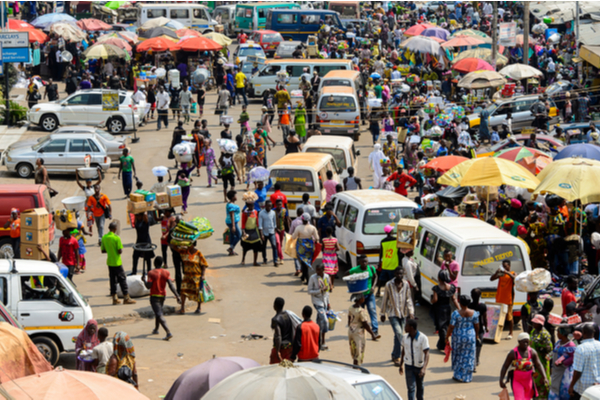The African Bicycle Contribution Foundation (ABCF), which had distributed 500 free Ghanaian-made bicycles, since 2016, at predominantly rural schools throughout Ghana, today announced a new “Collaboration for IT and Communications Excellence” program (africanbike-itexcellence.org), at a demonstration project, yesterday, at the Girls Model School, in Nabdam, Ghana, with students, teachers and administrators in attendance.
The foundation reached out to the Girls Model School, where it had distributed 50 free bikes to students in July 2018, to explore launching its computer lab initiative, there. Previously, the Girls Model School offered no classes focused on ICT.
More than 200 members of the Girls Model School’s Upper East Region community attended the event, which included presentations by Nabdam District leaders, the chairman and president of the Collaboration, A. Bruce Crawley and Patricia Marshall Harris, respectively, performances by the students, themselves, and by local cultural dance troupes.
Among those offering insightful and encouraging remarks to the students was Hon. Dr.Kurt Mark Nawaane, Member of Parliament, who said that “it has been proven that computers and a knowledge of information technology is important to those who are serious about moving schools and communities forward.”
“We are so pleased to be able to launch this new program at the Girls Model School, in Nabdam,” said the Collaboration’s president, Patricia Marshall Harris. “We will work to ensure that students at other rural schools across Ghana are eventually included.”
With the computers, related equipment and large-screen monitor being provided by “The Collaboration,” the school’s administrators have already begun to carve out space, in its existing facilities, for its first computer lab.
Under its new program, ABCF will continue to raise funds from corporate interests and individuals in the U.S., Africa, and elsewhere. The foundation’s focus, however, will no longer be on providing transportation support to students. Instead, ABCF will reach out to Ghana’s Ministry of Education, the Ghana Education Service, the worldwide private sector, schools, global tech leaders and universities to “Help Ghanaian Students and Entrepreneurs to be leaders in a Tech-Driven Global Economy.”
“As a foundation established by African Americans, we believe our ‘Year of Return’ was actually 2016, when we came to Ghana to purchase and distribute free bamboo bikes to rural under-resourced students,” said the Collaboration’s chairman, A.Bruce Crawley. “We have worked to bring positive outcomes to students across Ghana, since that time. Now, we trust that our funders will support this new and different effort that is designed to further prepare Ghana’s deserving young people for a globally competitive future.”
Notwithstanding, its recognition by UNICEF, as early as 2011, for having 84 percent of its children in primary school, which the organization claimed was an achievement “far ahead” of its West African neighbors; despite years of best-in-region budgetary allocations to public education, and its recent introduction of free secondary school, Ghana has continued to be challenged by what the International Finance Corporation, in its May 2019 report “Digital Skills in Sub-Saharan Africa: Spotlight on Ghana,” describes as the impact of the Fourth Industrial Revolution and the future of work in Sub-Saharan Africa, especially Ghana.
The report emphasizes that with the largest youth population in the world and some of the world’s fastest-growing economies, Sub-Saharan countries, including Ghana, will be especially challenged to “build the skills and expertise to drive competitiveness in the future.”
—
Photo Credit: Anton_Ivanov / Shutterstock.com
